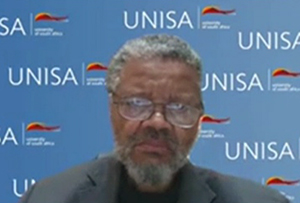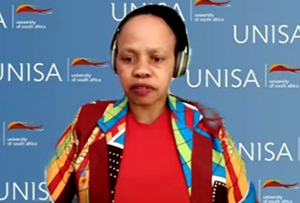

Prof Mandla Makhanya, Principal and Vice-Chancellor
Unisa deliberated on the theme of a key imperative for business and higher education collaboration at the virtual business roundtable engagement organised by the Office of the Principal and Vice-Chancellor on 13 November 2020.
The event aimed to broaden the university’s stakeholder and collaboration span to explore possible opportunities for the kind of collaborations that will be mutually beneficial, not only to businesses and higher education institutions, but also to society at large.
During his welcome remarks to set the scene, Prof Mandla Makhanya said since 1994 the growth and development of the nation had incorporated education and higher education, in particular, as a key pillar of national development. But the envisaged development had never quite measured up to expectations. "We have not realised the growth, progress, and prosperity that we had hoped for," he noted.
Sharing about a concerted focus on the redesign of pedagogy in line with the growing reliance on technology impelled by the pandemic, the VC declared that the university should not be left behind. "It is therefore understandable that the institution will incur very significant financial ICT-related expenditure for the foreseeable future, over and above the massive investments that have already been made as a result of the immediate operational response to the pandemic. This must be attended to as perhaps the institutional priority."
Makhanya added that a key part of this necessary transformation would have to accommodate the reality of changed or reprioritised budgetary requirements on the part of both the state and universities. "We have already noted that infrastructure subsidies will be withheld in many instances, while those monies are channelled into Covid-19-related expenses, for example. This means that Unisa will have to anticipate and adjust in real time to the changes that are likely to be made to our subsidy income and offset these by focusing on generating the income to make up the shortfalls and still provide for the desired additional projects," he said.

Prof Thenjiwe Meyiwa, Vice-Principal: Research, Postgraduate Studies, Innovation and Commercialisation
In addition, the VC warned the audience that universities were going to need to generate income and access resources outside of the traditional subsidy income base. "To meet these needs, many universities, including this university, have set up business or enterprise entities/units that are aimed at leveraging resources, setting up businesses, focusing research on innovations that can be patented, exploring win-win collaborations that will contribute to growth and development, and looking at short learning programmes for additional income generation - to name but a few. We are having to think differently and operate differently, and we are already seeing some exciting results."
According to Makhanya, the university has adopted a multi-pronged collaborative approach that aims to harness and share capacities required to achieve the institutional vision - which is to be the African university shaping futures in the service of humanity - and to drive radical socio-economic transformation, inclusive growth and development.
"There is also a dire need for enterprise development to create more jobs," said Makhanya. This, he added, "calls for creativity and innovation, but creativity faces a deadlock where ideas cannot meet capital, or when, where they do meet capital, the ideas lack mentorship to be transformed into fully fledged businesses," he said.
"We aim to further encourage creativity, capitalise the created ideas, and mentor the newly capitalised ideas into business units that can compete and add value to investors and customers. But we can’t do it alone. So, a key part of our strategy is to leverage the process and forces of business enterprise by creating the bridge between innovation and commercialisation," Makhanya concluded.
Presenting her address, Prof Thenjiwe Meyiwa, Vice-Principal of Research, Postgraduate Studies, Innovation and Commercialisation, said the university does research that matters. "We have seen how the entire world during the pandemic relied on research. Hence our research responds to the needs of communities and Africa as a whole," she affirmed.
Showcasing the kind of work the university is doing as far as ICT is concerned, Poppy Tshabalala, who is the Chief Information Officer and Vice-Principal of Information and Communication Technology, said to enable mobility and productivity, partnerships are needed. She explained the strategic principles the university is adopting to ensure that her portfolio takes the lead to implement a digital business platform that will help Unisa to remain relevant and competitive.
* By Lesego Ravhudzulo, Journalist, Department of Institutional Advancement
Publish date: 2020-12-01 00:00:00.0